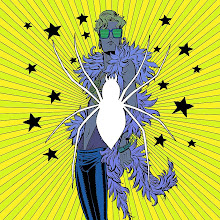Monday, May 17, 2010
NIGHT FIGHT: Gentlemen Prefer Blondes Edition
Thursday, May 6, 2010
Hey! Turns out I go to school
So in reality, I'm a college student who writes things sometimes. Here's a 2000 word treatise on how we're being treated like idiots.
EDIT: You know what, here. Here's a playlist to listen to while you read this.
Beat on Repeat:
Why we're still partying like it's 1959
In 1957, Miles Davis released an album called "The Birth of the Cool," a compilation of tracks from 1949 and 1950. And brother, when it comes to prescient album titles "The Birth of the Cool" cannot be beat. The title ostensibly refers to the "Cool Jazz" style of the record, but I could care less about Jazz. The fifties are where Cool was born. Cool, the essential teenage life-fluid that every single advertising agency in the world has been trying to bottle and sell back to the young. The difference between owning a leather blazer (ugh) and a leather jacket (rad). The 50's were when all the swirling influences from history coagulated and the first miners of its ideals like Brando, Dean, and the early Rock 'n Rollers came together to make up the trends that cool people are still following today. With the help of smash hit movies, the standards were set. But once the floodgates of teenagers with disposable income were open, they were hard to close and studios played have played to the same exploitative styles for decades since, with varying degrees of success.
Understand first where the idea of cool comes from. This, Miles Davis and his contemporaries definitely had a hand in. The idea of "Cool" is actually far older than the 1950's. African tribes at least as far back as the 1500's have revered the characteristic that they called "Itutu," which closely resembles the basis of coolness, namely an almost otherworldly detachment from reality. While western cultures valued sang-froid, or a "coolness of blood," the african concept embraces a more creative nonchalance1, as opposed to aristocratic demeanor and composure. And that's where Miles Davis and the rest of Jazz crew come in. Black bebop musicians jump-started the bohemian beatnik revolution of the fifties and, like Rock 'n Roll, it filtered down through until white postwar suburban teens. Clearly, the longstanding ideal of making people like you by not caring if they like you has its roots further back than anybody who used the phrase "Daddy-o."
